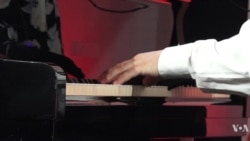What happens when a piano is combined with technology?
“Kids or anybody could learn how to play the piano really properly from the best musicians in the world,” said Mischa Dohler, composer and professor of Wireless Communications at King’s College London.
'Could we digitize skills?'
Dohler’s aim is to build a database that records the movements of a piano player’s hands with the help of a special sensing glove that tracks every movement of the musician’s joints. Once the data is collected, a piano student can then wear another glove that can train the student’s hands.
“You could imagine this so-called exoskeleton that you can put on your hand. It will pressurize the hands and the joints, and will move it gently at the beginning, and nudge essentially the body into the right shape and in the right way of moving your hand,” Dohler said.
It is an example of what Dohler calls the “Internet of Skills” that he is demonstrating at the Optical Fiber Communication Conference and Exhibition in Los Angeles.
“We use digital today to negotiate for jobs. We use LinkedIn, emails, etc., but then to execute the work, we still need to drive. We need to fly. We need to walk. So I was thinking, ‘Could we virtualize it? Could we digitize skills?’”
Health care application
Another application for the “Internet of Skills” is health care.
Motivated by the Ebola crisis in Africa, Dohler is trying to develop a way for doctors to treat a patient thousands of miles away, especially in remote areas where medical skill is lacking, where virtual reality and low-cost technology can link the doctor and patient in a way never before possible.
“What I’m trying to do is first of all give the surgeons back the feeling of touch, so he feels what he does inside the body; and the second thing is, I want him to be able to have this console somewhere in another hospital. So the only thing we’re doing is the cable between the console and the patient and make it longer and make it an internet,” Dohler said.
It is only possible if large amounts of data can travel very quickly, more specifically, 10 milliseconds for action and reaction to occur. Companies are already developing hardware to move information faster.
Depends on data, speed
“It all came about with video. The way we view content today is very different from the way we viewed it before, and getting content to everybody, whether it’s on their iPhone or their android devices or on their PCs everywhere takes the underlying network,” said Eve Griliches, product line manager at Cisco Systems.
She said many new networks that transport and transmit growing amounts of data are being built by private networks.
“Everybody has a stake in the game now. Everybody has a stake,” she said. “And the beauty about getting the content to everybody, more so the other step, is as we’re opening up the networks and creating the sort of open source society in the networking area, it allows people to build on it,” Griliches added.
As technology continues to catch up with what the brain can imagine, Dohler envisions the “Internet of Skills” democratizing labor in about a decade, just as the internet has made knowledge available to all.











